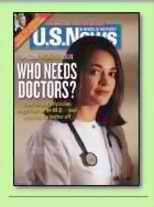Today is Valentines Day, and Happy Valentines Day to all of you!
As I go back to regular programming, I will now tackle a "marriage that has gone sour." I'm sure many of you have noticed it too, but were either oblivious of the fact, or simply cynical that nothing would ever come out of it anyway even if you complained.
Most good things really never last. The 2nd law of thermodynamics seem to be constantly in operation, even in our everyday lives. Sometimes I think people are to blame too, and not just the circumstances. What am I talking about?
 I subscribe to several medical journals and US magazines which get to me on time, and while that is commendable, the problem is that I don't have the luxury of reading them when they should be read. Take for example the January 31 issue of the mag on the left....it had a very interesting cover story, but which I got to read only now. It had a lengthy and informative discussion of a deteriorating doctor-patient relationship over the years in the US. The significance lies in the subsequent atrophy of the quality of care delivered to many patients who consult with doctors in their clinics.
I subscribe to several medical journals and US magazines which get to me on time, and while that is commendable, the problem is that I don't have the luxury of reading them when they should be read. Take for example the January 31 issue of the mag on the left....it had a very interesting cover story, but which I got to read only now. It had a lengthy and informative discussion of a deteriorating doctor-patient relationship over the years in the US. The significance lies in the subsequent atrophy of the quality of care delivered to many patients who consult with doctors in their clinics.Let me share it with you, here are some exerpts:
The doctor-patient relationship in the US has been observed to be suffering over the years, because both personalities have assumed what Dana Safran (director of the Health Institute at Tufts-New England Medical Center) terms as "new, expanded agendas." And what are these agendas?Who Will Take Care of You? By Josh Fischman
It is no longer a happy marriage, this relationship between doctors and patients. A bond once tight with intimacy is under incredible strain. Doctors have changed. Patients have changed. The caring is gone. Well, not gone but buried under the crush of everyday life. Buried under insurance headaches as patients now come burdened with reams of paperwork for doctors to fill out for reimbursement, paperwork that eats away at the time they might spend on other patients. So do fees, doctors say, because what insurance pays them is well below their costs. So, in a vicious circle that steals more time, they have to see --- and bill --- a lot of patients each day and shuffle them out of the office no matter how much attention they might really need. "Family physicians are getting stressed to the max," says Mary Frank, who is president of the American Academy of Family Physicians and has a private practice in Rohnert Park, Calif., north of San Francisco.
Patients, for their part, frequently switch insurance plans to save money, but changing plans means changing care, because the new plan may not cover the old doctor. Nobody gets to know anybody anymore. "Look, docs are nice people, but they're really time pressed," says Todd Ringler, 37, a public relations executive who lives in Swampscott, Mass., outside of Boston. "I found I wasn't able to have conversations that went beyond 'Tell me where it hurts. What's the level of your pain, from 1 to 10?' If you can't go further than that, you can't develop honest communication about your health or health problems."
[U.S. News and World Report]
In practice, I have always noticed that the American patient is more talkative and inquisitive than most Filipino and Asian patients. The American patient demands to know what's happening in every part of the clinical management, whereas his Filipino and Asian counterpart would be happy to get the whole treatment procedure over and done with as little talk as possible.
The American doctor, on the other hand, spends more time asking their patients all sorts of "biomedical questions" which they have been pressured to ask by insurance companies and healthcare oversight agencies in order to facilitate payment of fees.
So much of the talk that goes on inside the clinic no longer permits the doctor and the patient to develop a friendly relationship, which the article said was the norm in the past. This friendly and cordial relationship between doctor and patient has been shown in studies to be beneficial in the overall patient treatment process.
In the Philippines, there's also a deterioration of the patient-doctor relationship but it has different reasons and the gravity is not as much as it is in the US. I will talk about that in another post.
Meanwhile, enjoy that sentimental Valentine dinner with your sweetheart tonight.

1 reactions:
Good blog you got here. Any others? I was just blogging and noticed yours, good job. Happy blogging!
regards,
florida health insurance quote
Post a Comment